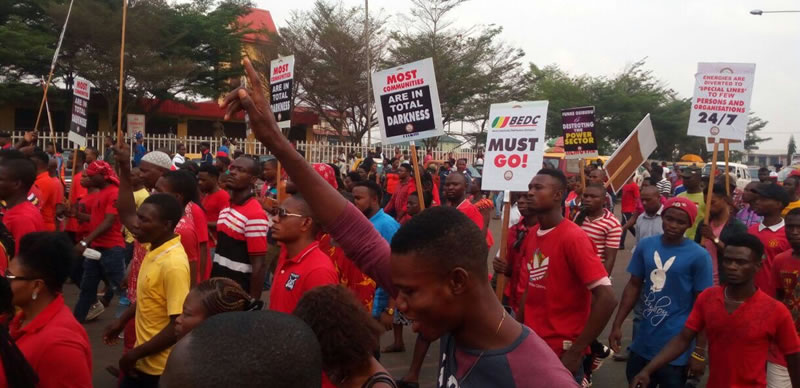The current industrial crisis in the nation’s health sector may take another dangerous twist following a fresh 15-day ultimatum issued to the Federal government by the Joint Health Sectors Unions, JOHESU, and Assembly of Healthcare Professional Associations, AHPA, to meet demands.
It is important to note that, JOHESU and AHPA had earlier suspended their planned industrial action billed to commence at 12 am on Saturday, September 18, 2021, over unmet demands following an understanding it had with the government.
However, rising from their emergency meeting of the expanded National Executive Council, NEC, the Unions recently gave the government another 15 days to accelerate the process and fulfil their demands within the speculated time.
Also, this is not the only period the union will be going to strike in Nigeria as the health workers had gone on a strike that lasted for more than forty days. Infact, the strike is one of the biggest blows Nigeria’s health industry had suffered.
Since 2014, they have been asking government to increase their pay and improve their members working conditions among other demands.
Before the strike started, JOHESU warned that it will be a ‘mega strike’ that will shut down not just federal health institutions but the states and local governments too; and they made good of their threat.
The strike caused many deaths. Patients were made to pass through untold pain and their relatives were grumbling as both federal, state and local government health institutions were brought to their knees.
The situation waa even worse for pregnant women and nursing mothers in dire need of either post or ante-care. This was because essential staff, nurses and midwives — some of the most influential members of JOHESU — had all downed tools.
It’s worthy of note that, workers’ strikes involve the collective withholding of labour/services by a group of workers for the purpose of extracting certain concessions or benefits and are usually intended for the economic benefits of the strikers.
In Nigeria, the law allows all workers to form or join unions, with the exception of members of the armed services, the police force, firefighters, Central Bank employees and customs and excise staff While the first recorded strike action in history took place during the reign of Ramses III in the twelfth century BC, health workers’ strikes have remained commonplace throughout history as well as in Nigeria.
The first nationwide strike by the organized workforce in Nigeria was on 21 June 1945 by about 150 000 clerical and non-clerical workers in the Nigerian civil service, demanding better wages in response to the rising cost of living brought about by the Second World War.
In recent years, the Nigerian health system has experienced different strikes involving doctors, nurses and allied healthcare workers. These strikes have negatively impacted on the healthcare system, leading to several avoidable deaths, complications and outgoing medical tourism, as the wealthy seek health services abroad.
The impact of these strikes is worst when they occur at periods of national health emergencies such as the recent Corona Virus outbreak, Lassa fever or cholera outbreaks or even man-made emergencies like Boko Haram suicide bombings with mass casualties.
Reasons abound why healthcare workers go on strike in true underlying causes of industrial action in Nigeria, and these include career stagnation, perceived discriminatory policies and demoralization from working in systems with poor infrastructure, manpower shortages and poor personal remuneration. However, in recent times, there has been a division of opinion on pinpointing the true underlying causes of industrial action.
While reacting to the implications of strike on the health sector, Analysts cited disruption of patient care as the most common implication of health worker strikes in Nigeria. For these Analysts, perceived consequences and reasons for further discontent were high referral rates to private hospitals, patient loss to follow-up, mismanagement by alternative healers and high private hospital costs.
Other common effects of strikes by healthcare workers on patients and healthcare systems cited by Analysts were an increase in financial burden on patients; increased morbidity and mortality, especially amongst the poor; collapse of publically funded health facilities; loss of confidence in the health system; unequal access to quality medical care; emigration of qualified health workers; increased spread of contagious diseases; and negative impact on national productivity.
Although Analysts were concerned with the effects of the strikes on patients, they were of the opinion that strengthening of the healthcare system, improving financial and professional motivation of health workers and involving healthcare workers in decision-making are possible solutions to the plethora of strike action in Nigeria.
On specific changes in the health industry that would bring about an end to the numerous strikes in Nigeria, findings show that, leadership and management, salaries of workers, financial management and infrastructural changes as crucial.
However, for health workers in Nigeria, the most important change each of them would like to see is a change in leadership and management. Others are improved financial management and enhanced salary of workers.
In addition, Analysts are of the view that the following would eliminate or prevent the occurrence of health workers’ strikes in Nigeria: government sensitivity to the needs and demands of healthcare workers; negotiations with all parties involved; the government taking the agitations of the healthcare sector workers more seriously; salary increase to be effected; changes to labour laws; reduction of corruption and increase in transparency; proper outlining of job descriptions for various healthcare providers; training and re-training of staff to understand the value of efficiency; good inter-professional relationship; and creation of policies that improve the state of health institutions.
To mitigate against continued health workers’ strike in Nigeria, it’s partinent that, government should employ more workers, provide better infrastructure, invest more on healthcare, organize seminars and training, monitor the promotion process and root out corruption, while improving staff welfare packages and better equipping the health centres.









